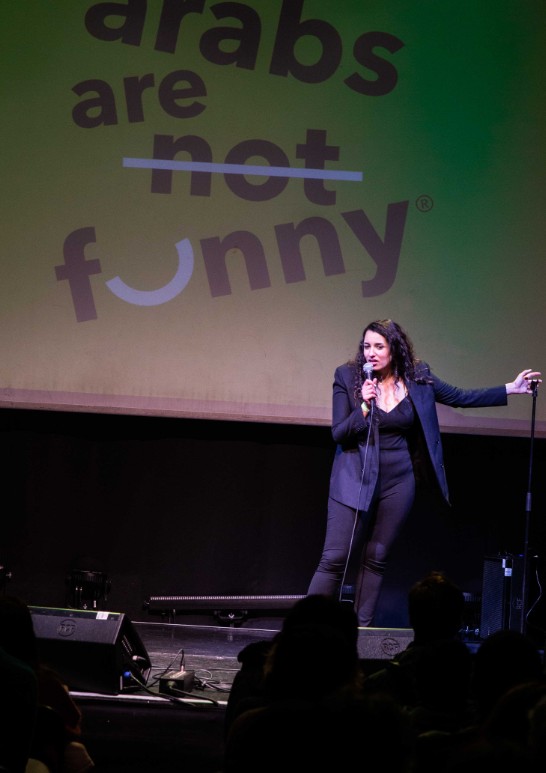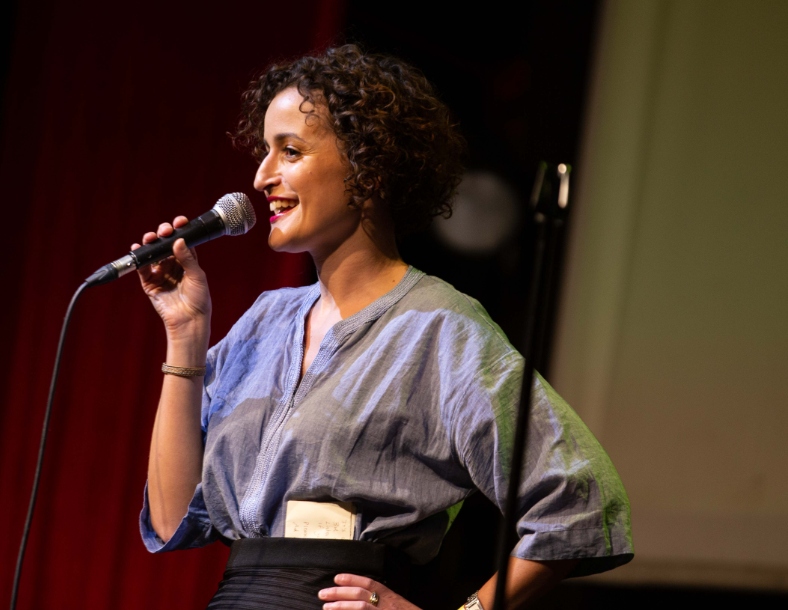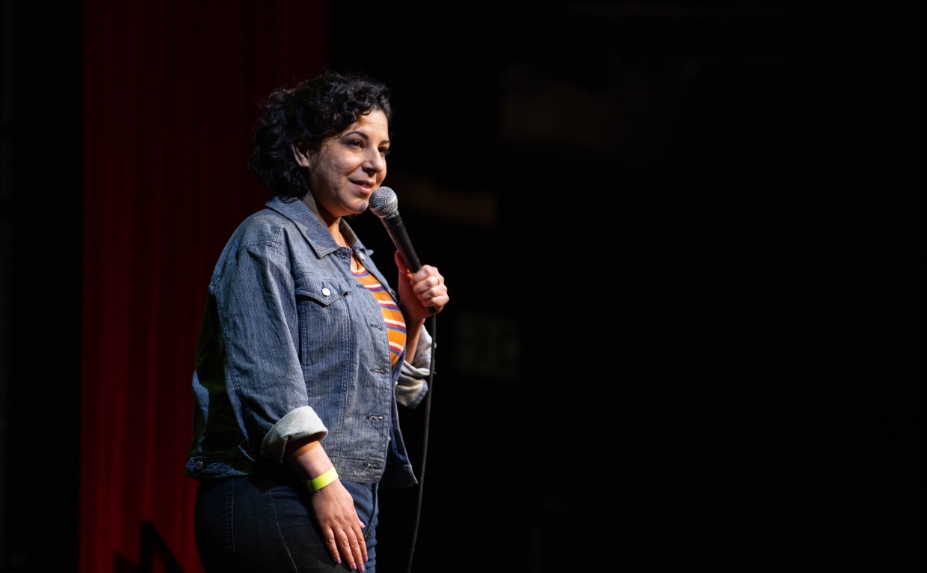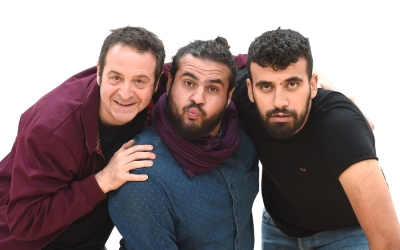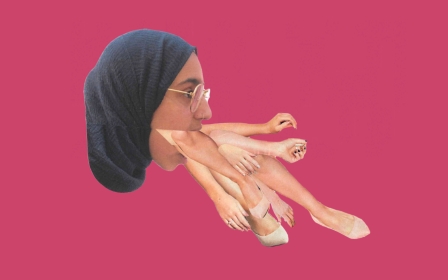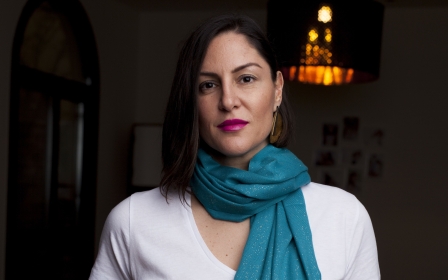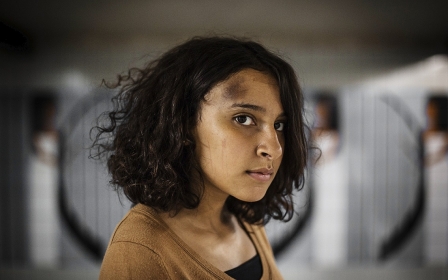Corona comedy: Arab women comics laugh in the face of adversity
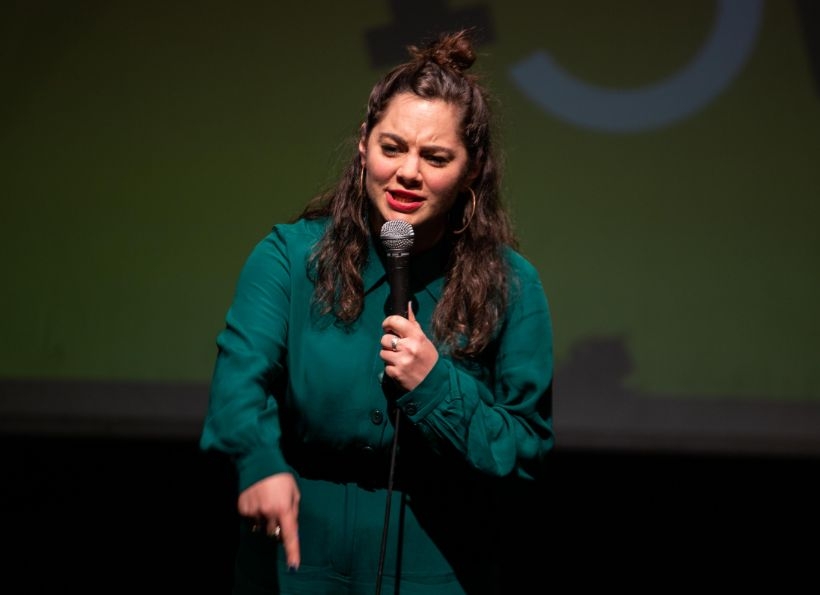
Amid the coronavirus pandemic, they came to laugh. Social distancing and self-isolation may be the order of the day, but at East London’s Rich Mix venue on Friday the 13th there was little sign of it, except perhaps for elbow bumps in place of cheek kissing and hugs.
Arabs Are Not Funny, the comedy brand created by UK Arab cultural promoter Arts Canteen, brought together six Arab women comedians in what its founder and chief executive, Aser El Saqqa, describes as “really a miracle” under the circumstances.
“People are very concerned but again people want to laugh, for this particular night, just perhaps to get over what’s happening on the screens and the news,” he tells MEE before the show.
Friday night’s show was part of the sixth Arab Women Arts Now (AWAN) festival in London this month, a programme of arts and performances by women from the Arab world. “We had a very successful opening, a very intensive weekend, four packed dates,” says El Saqqa.
'This is my last gig of the month - everything else got cancelled'
- Serine Ayari
The comedy line-up was international: hosted with great charm by Lebanese-British standup Isabelle Farah, she introduced fellow Bahraini Brit Jenna al-Ansari, two acts from Europe - Serine Ayari (Belgium) and Leila Ladari (Swiss Tunisian); and Moroccan Laila Alj.
New MEE newsletter: Jerusalem Dispatch
Sign up to get the latest insights and analysis on Israel-Palestine, alongside Turkey Unpacked and other MEE newsletters
With an escalating pandemic, Britain is gradually shutting down entertainment venues in order to stop the spread of disease, so the night felt like a last hurrah. “This is my last gig of the month - everything else got cancelled,” says Ayari as she arrived on stage, fresh in from Belgium.
Several of the comedians alluded to the virus - one, Alj, even ended her act with a Shakespearean “sonnet COVID-19” (more of which later).
The show was put on by Art Canteen’s standalone comedy brand, Arabs Are Not Funny (AANF), which promotes a range of Middle Eastern comedy talent and has put on more than 30 sellout shows, including two at Dubai Opera house in 2018. But this all-female night represents a new turn.
Freedom of speech
As she took the stage, Ayari celebrated the presence of a diverse Arab crowd - Tunisians, Palestinians, Algerians, Iraqis, Moroccans, and at least one Saudi (who defiantly shouted “not representing”).
Ayari is engagingly funny on the trials of being a Tunisian girl growing up in Belgium. “Every time I had a question, my dad said ‘just do what the Belgians do’. So December 25th, I said ‘yo dad I’ve been doing like the Belgians did, it’s Christmas, where the f*** are the gifts?’”
Then, aged six, she had to confront a Flemish neighbour who said he wouldn’t let her play with his daughter because she was “Turkish” - her telling him she was Tunisian made no difference. “Don’t worry,” she quips. “I got my revenge, I dated his nephew.”
For Ayari, 28, this is her third outing at AANF after her first appearance at Awan in March 2019 and then at the Shubbak Arab arts festival last summer in London. She has been doing standup for less than two years but she’s already come a long way since her first gig in Flanders, the Flemish-speaking northern part of Belgium where she lives, near Brussels ("You remember that place?" she asks, post-Brexit).
“I got a pretty easy jump when I started doing standup in Belgium and Flanders because there I was the first Arab female comedian doing it, so immediately a lot of people were curious about what I was doing,” she tells MEE.
Ayari adds that for her, standup means more than just being funny, it means standing up for something. “My comedy really comes from a personal perspective, and I’m never going to try to please the crowd by saying things I don’t necessarily stand behind or believe in that moment.”
In France and Belgium the rules of comedy are stricter than in the UK and US, she says. Some jokes can get you in trouble - both from local authorities who set down rules on what is acceptable, and also from some within Muslim communities in a polarised atmosphere of pervasive Islamophobia. In fact, she has faced death threats for her comedy routine, which, with lines such as “I’m not the halal type”, touches in an irreverent way on religion and sex.
Following threats made online last October, French police opened an investigation against three hardline Muslim influencers who incited their followers against her. “The case is still going on against three people who police are investigating, because they asked all of their followers to boycott me, to send me threats, to find me. There’s one who asked his followers to find me and to make sure that when they found me that this is the moment when I take my last breath.”
As a result of the threats she lost a lot of money because of gigs getting cancelled, she says.
Couscous wars
Laila Alj is less upbeat and more deadpan than some of the other acts. Describing herself as a “bit of a cold bitch”, a singleton with a cat as a flatmate, she offers sharp, misanthropic takes on London life. “I really hate London at the moment,” she tells the audience. “I’m only finding joy in the misery of other people... these days I enjoy coughing in public places and watching the panic unfold around me.”
Her staple, though, is her family and life in Morocco. Her grandmother telling her to get a nose job, her parents’ refusal to accept she’s a vegetarian. “There’s so much we do well in Morocco - we’ve got the best couscous (this is a running theme of the night with Ayali already claiming this for Tunisia, to much uproar), we have sunshine, we have sexism.”
It’s not at all clear when she’s being serious, or not, which creates moments of comedic unease. “You can’t shout too loudly about women’s rights in Morocco. We don’t really have a word for feminists in Morocco, we just call them lesbians.”
Alj studied drama in the US before moving to London a decade ago: “I was really cool and exotic, I was generically ethnic, no one knew where I was from,” the 32-year-old says of her time in Chicago. “No one knew where Morocco was.” (The Americans in the audience, who whoop as she acknowledges them, took this and other putdowns very well.)
'We don’t really have a word for feminists in Morocco, we just call them lesbians'
- Laila Alj
Alj says her dad, who features a fair bit in her act, is an inspiration. “He’s a funny man, he loves that I talk about him, he won’t say he’s proud but he’ll send the videos to everyone,” she tells MEE.
Alongside small parts in TV drama Homeland, films and on British TV, Alj is a theatre actor. “I love the stage, which is what drew me to comedy in the first place, because I wasn’t performing as much as I wanted to,” she says. “And it was an opportunity for me to be in control when I got up on the stage to perform.”
She, like the other artists, is grateful to be part of this all-female line-up within a woman-centred Arab arts festival. “When you see films and TV, plays as well, when there’s the Middle East Arabs, its 90 percent men versus one or two female characters, if even that. Something like Awan is a whole month dedicated to women artists who are there, existing, working just as hard as the men, so it’s definitely important that it’s there.”
El Saqqa agrees. “Historically the comedy scene has always been dominated by men. It was about time that we tried to trace and reveal some of this incredible material that is written by Arab female comedians, and to be active in English, it does enrich the whole scene.”
LA, London, Gaza
One of those talents is veteran Egyptian-American standup Maria Shehata, who closed the night at Rich Mix with a superbly assured, rapid-fire act that left the crowd sated and ready to face whatever news cycle horrors awaited them.
Shehata moved from Los Angeles to London several years ago, she tells the audience. “I miss LA a lot, but it’s nice being around smarter people for a change,” she quips.
Shehata has appeared on American cable networks Comedy Central and Showtime, and her set - with themes of cultural mishaps and dating hell (“women don’t accidentally fall in love, we hunt that shit out”) - felt fresh, finely honed and unerring in its relentless punch power.
Like Alj before her, Shehata also ribs Americans over their lack of knowledge of the Arab world. She quotes a friend in LA saying, “Ah dude, you’re Egyptian, I thought those people were extinct.”
On the street in LA, a man insists that she’s Latina and wants her to speak Spanish. “I’m short, I’m brown, my name’s Maria, I get it, I tricked you... now if you don’t mind I’d like to get back to eating my burrito.”
Now in the UK there are new challenges. On dating an English guy, she says: “Our money spending styles were different, I’m eight credit cards in debt and he gets physically sick if he has to buy dinner.”
She complains about her overprotective dad, who needs to know where she is all the time - so when she went to Palestine on a Middle East tour in 2011 he wasn’t happy. “Then the Arab Spring broke out, so one by one we were crossing off countries - Egypt, Yemen, Syria, Lebanon - so in the end we just went to Gaza, where it was safe.” The audience is in stitches, but she’s not done. “I’m in Gaza and I’m teaching refugees and somebody from Hamas comes in, ‘your dad is on the phone, you need to take this, we can’t negotiate with this man.’”
If there was a sense of what all the acts had in common, it was turning familiar themes - love or the lack of it, career failures, cultural difference and parents who don’t quite get it - into something unusual and exciting, about what it feels like to be female and Arab, dealing with the same everyday stuff as the diverse crowd who came to see them.
And with coronavirus shutting down live performance in the UK for the foreseeable future, the last word should go to Alj's sonnet: “Please wash your hands, and stay home if you’re sick, and don’t buy all the toilet roll, you p****.”
The 2020 Arab Women Arts Now (AWAN) festival is at Rich Mix in London from 5-29 March
Middle East Eye delivers independent and unrivalled coverage and analysis of the Middle East, North Africa and beyond. To learn more about republishing this content and the associated fees, please fill out this form. More about MEE can be found here.


